Discover Foreign Policy Live
Foreign Policy Live

Foreign Policy Live
Author: Foreign Policy
Subscribed: 9,473Played: 178,723Subscribe
Share
© 062646. Copyright 2021, Foreign Policy/The Slate Group LLC, a Graham Holdings company. All rights reserved.
Description
Each week, Foreign Policy Live will feature a substantive conversation on world affairs. Host and FP editor in chief Ravi Agrawal will be joined by leading foreign-policy thinkers and practitioners to analyze a key issue in global politics, from the U.S.-China relationship to conflict and diplomacy. FP Live is your weekly fix for smart thinking about the world.
Foreign Policy magazine subscribers can watch these interviews live and submit questions and suggestions by going to https://foreignpolicy.com/live/.
189 Episodes
Reverse
Despite headlines suggesting otherwise, this week’s guest says women’s rights around the world are making real gains. Lyric Thompson, the founder and CEO of the Feminist Foreign Policy Collaborative, sits down with host Ravi Agrawal to share more.
Transcript: The Good News on Women’s Rights
Lyric Thompson: Women’s Rights Are Winning
Rebecca Turkington and Saskia Brechenmacher: Trump Erases Women From Foreign Policy
Hawon Jung: South Korean Women Are Powerful—and Powerless
Learn more about your ad choices. Visit megaphone.fm/adchoices
It’s time for another Ask-Me-Anything edition of FP Live. Executive Producer Dana Sherne puts your questions to host Ravi Agrawal.
Alexandra Sharp: Ramaphosa Capitalizes on Trump’s Absence at G-20 Summit
Christian Caryl: Don’t Call This a ‘Peace Plan’
Rachel Oswald and John Haltiwanger: Trump’s Ukraine Peace Effort Devolves Into Chaos Over Conflicting Stories
Ryan C. Berg: Toppling Maduro Without Boots on the Ground
James Palmer: China-Japan Rift Deepens Over Taiwan
Learn more about your ad choices. Visit megaphone.fm/adchoices
Climate summits such as the ongoing COP30 conference can often seem like a place where countries agree to disagree and little gets done. But Bill McKibben says there’s one key reason for hope: the sun. New advances in panels and battery technology mean solar power will soon provide a growing share of our electricity consumption.
McKibbon is the author of the new book Here Comes the Sun: A Last Chance for the Climate and a Fresh Chance for Civilization.
Plus Ravi’s One Thing on Iran’s water crisis.
Nik Kowsar and Alireza Nader: Tehran’s Residents Are Panicking as the Taps Run Dry
Christina Lu: How China Became a Solar Power
Joseph Rachman and Indra Øverland: A Power-Hungry Southeast Asia Wants China’s Energy
Nigel Pruvis: Will Belém Kill Paris?
Jason Bordoff and Jack Andreasen Cavanaugh: AI’s Rapacious Appetite for Electricity Can Accelerate Clean Energy
Learn more about your ad choices. Visit megaphone.fm/adchoices
As the United States points its biggest warship at Venezuela, what is the White House trying to achieve in Caracas? How does it fit into the Trump administration’s broader Latin America policy? And how is the region responding? Host Ravi Agrawal sits down with scholar Oliver Stuenkel for answers.
Stuenkel is a leading Latin America scholar and senior fellow at the Carnegie Endowment for International Peace.
Plus Ravi’s One Thing on COP30.
FP Columnists: 5 Novelists on Their Favorite Climate Fiction
Oliver Stuenkel and Adrian Feinberg: Milei’s Midterm Miracle
Matthew Kroenig: Trump Should Oust Maduro
Carlos Ruiz-Hernández: The Nostalgic Delusion of 1989
Philip A. Berry: The Use and Abuse of ‘Narco-Terrorism’
John Haltiwanger: Latin America’s Disjointed Reaction to Trump’s Drug Boat War
Geoff Ramsey: What’s the U.S. Endgame in Venezuela?
Ryan C. Berg: Toppling Maduro Without Boots on the Ground
Catherine Osborn: How Migration Became a U.S. Foreign-Policy Priority
Learn more about your ad choices. Visit megaphone.fm/adchoices
China analyst and former policymaker Elizabeth Economy sits down with Ravi Agrawal to unpack the meeting that took place last week between U.S. President Donald Trump and Chinese President Xi Jinping. What was agreed to? What does it mean for the broader trajectory of the world’s most important bilateral relationship?
Plus, Ravi’s One Thing on Trump threatening military action in Nigeria.
Kọ́lá Túbọ̀sún: Why Is Trump Suddenly Talking About Invading Nigeria?
Wall Street Journal: Lingling Wei: China’s New Strategy for Trump: Punch Hard, Concede Little
Rishi Iyengar, Christina Lu, and Keith Johnson: What Trump and Xi Did—and Didn’t—Agree to
James Palmer: Trump and Xi Step Back From the Brink—for Now
Alasdair Phillips-Robins: Xi May Have Miscalculated on Rare Earths
Christina Lu: Will Trump’s Critical Minerals Blitz Pay Off?
Learn more about your ad choices. Visit megaphone.fm/adchoices
Is the AI boom a bubble? What happens if it pops? Economist Jared Bernstein joined FP Live to sound the alarm on the growth and investment in the AI sector.
Plus, Ravi’s One Thing on the first Trump-Xi meeting in six years.
James Palmer: Trump and Xi Step Back From the Brink—for Now
Rishi Iyengar, Christina Lu, and Keith Johnson: What Trump and Xi Did—and Didn’t—Agree To
Sahil Shah: Trump’s Vagueness Over Nuclear Testing Could Fuel an Arms Race
New York Times: Jared Bernstein and Ryan Cummings: Warning: Our Stock Market Is Looking Like a Bubble
Ravi Agrawal: Is the AI Economy a Bubble?
Bhaskar Chakravorti: 10 New AI Challenges—and How to Meet Them
Bhaskar Chakravorti: American AI Is High on Its Own Supply
Brought to you by: quince.com/fplive
Learn more about your ad choices. Visit megaphone.fm/adchoices
How can history help make sense of U.S. President Donald Trump’s foreign policy? Pulitzer Prize-winning author and historian Greg Grandin shares how Trump’s imperialist impulses may be inspired by the country’s Founding Fathers, and that he “rummages around the trash bag of history to find what’s useful at any given moment.”
Plus, Ravi’s One Thing on the recent U.S. sanctions on Russian oil companies.
Keith Johnson: Will Trump’s Russia Oil Sanctions Finally Sway Putin?
Greg Grandin: America, América: A New History of the New World
Ravi Agrawal: Why Trump Is a ‘Scarcity President’
Syrus Solo Jin: With Territory Comes Torment
Stephen M. Walt: Donald Trump Will Never Be a Restrainer
Learn more about your ad choices. Visit megaphone.fm/adchoices
With the cease-fire more than a week old, Palestinians now turn to what comes next: rebuilding and governing. Former spokesperson for the Palestine Liberation Organization Diana Buttu sits down with Ravi Agrawal to share her perspective.
Plus, Ravi’s One Thing on the Trump administration’s moves on Venezuela.
Diana Buttu: A ‘magic pill’ made Israeli violence invisible. We need to stop swallowing it.
Omar H. Rahman: Can Palestinians Trust Donald Trump?
Daniel Byman: One Question Looming Over the Gaza Deal: Why Now?
Michael J. Koplow: Three Reckonings the Gaza Deal Will Force
Christopher Sabatini: Will Venezuela’s Nobel Peace Prize Winner Stick With Trump?
Geoff Ramsey: What’s the U.S. Endgame in Venezuela?
Learn more about your ad choices. Visit megaphone.fm/adchoices
43 percent of voters under 30 supported U.S. President Donald Trump in the 2024 election, a 7 percent jump in support from both the 2016 and 2020 elections. What’s underpinning this rightward shift among young voters? Conservative commentator and journalist Emily Jashinsky shares her take.
Plus, Ravi’s One Thing on the Israel-Hamas deal over hostages and an end to hostilities.
Megan DuBois: The Shape-Shifting MAGA Hat
Adrian Karatnycky: An Emerging Trump Doctrine?
Emma Ashford: Four Explanatory Models for Trump’s Chaos
Emma Ashford: If Trump Is Neither Hawk nor Dove, What Is He?
Howard W. French: Trump Is Ushering in the Era of the Strongman
Stephen M. Walt: How Assassinations Became Normal Again
Julian E. Zelizer: Why Don’t Younger Americans Vote?
Learn more about your ad choices. Visit megaphone.fm/adchoices
Tuesday marks two years since Hamas’s attack on Israel on Oct. 7, 2023. Since then, Israel has decimated Gaza in what many independent organizations are calling a genocide and attacked several countries in the region. How have all of these events impacted the world? FP columnist Stephen M. Walt sits down with Ravi Agrawal to share his take.
John J. Mearsheimer and Stephen M. Walt: The Israel Lobby and U.S. Foreign Policy
Stephen M. Walt: Meet the New Middle East, Same as the Old Middle East
Steven A. Cook: The Delusions Driving U.S. Policy in the Middle East
Pankaj Mishra: How Gaza Shattered the West’s Mythology
Emma Ashford: What Was the Tipping Point on Gaza?
John Haltiwanger: Why Israel’s War in Gaza Has Been So Deadly for Journalists
Learn more about your ad choices. Visit megaphone.fm/adchoices
With increased polarization and ongoing budgetary disputes, the U.S. government does not seem to be acting in the way that the American forefathers intended. Host Ravi Agrawal brings on historian Jill Lepore to share more. Lepore is a professor at Harvard University and the author of We the People: A History of the U.S. Constitution.
Plus, One Thing from Ravi on the U.S. government shutdown.
Rishi Iyengar: How a U.S. Government Shutdown Could Impact Washington’s Foreign Policy
John Haltiwanger: Why America’s ‘Unusual’ Democracy Leads to Shutdown
Andrew O’Donohue: The U.S. Judicial Crisis Is Uniquely Dangerous
Stan Veuger: Americans Need to Acknowledge Their Unwritten Constitution
Learn more about your ad choices. Visit megaphone.fm/adchoices
Qatar often presents itself as a neutral mediator in the world’s trickiest problems, but on Sept. 9, its sovereignty was violated as Israel launched a strike to assassinate top Hamas leaders in Doha. Will Qatar change its strategy? No, explains Majed al-Ansari, the spokesperson of the country’s Foreign Ministry, at a live event with host Ravi Agrawal along the sidelines of the 80th U.N. General Assembly.
Plus, One Thing from Ravi on a feeling that seems in rare supply but was surprisingly abundant in New York this week: hope.
Mina Al-Oraibi: Qatar Strike Creates Rift but Not Rupture in Gulf-Israel Ties
Matthew Duss: Recognize Palestine, Then Put Real Pressure on Israel
Ravi’s interview with Tedros Adhanom Ghebreyesus
Ravi’s interview with Prince Zeid Ra’ad Al Hussein
Learn more about your ad choices. Visit megaphone.fm/adchoices
How is Europe navigating the Trump administration and a troubling moment in the trans-Atlantic relationship? FP Live host Ravi Agrawal sits down with Kaja Kallas, the European Union’s top diplomat, on the sidelines of the United Nations’ annual meetings to discuss relations with Washington, Russia’s war in Ukraine, recognizing Palestine, and dealing with China.
Plus, One Thing from Ravi on a spate of countries recognizing Palestine.
South China Morning Post: China Tells EU it does not want to see Russia lose its war in Ukraine: Sources
Sam Skove: Trump Makes U-Turn on Ukraine Rhetoric
Christian Caryl: Europe Is on Its Own With Russia Now
Ravi Agrawal: How Europe Is Navigating Trump
Agathe Demarais: Europe’s Hippopotamus Strategy for Handling Trump
Caroline de Gruyter: Europe Has Found Its True Language
Anchal Vohra: Trump’s Trade Deal With Europe Is Already Unraveling
Learn more about your ad choices. Visit megaphone.fm/adchoices
The dismantling of the U.S. Agency for International Development this year left countries scrambling, with many analysts going as far as calling the shutdown inhumane. But values were never the real driver of the global development agenda, says FP columnist Adam Tooze—it was actually about power. Now that the United States has stepped back, can China fill the void? Does it want to? Tooze sits down with host Ravi Agrawal to discuss his piece “The End of Development” in FP’s latest print issue.
Plus, One Thing from Ravi on the global connections to the Charlie Kirk killing.
Alejandro Reyes: Why Charlie Kirk’s White Nationalism Resonated With Some Nonwhites Abroad
Adam Tooze: The End of Development
Adam’s economics podcast: Ones and Tooze
Daniela Gabor: How Big Finance Ate Foreign Aid
Henry Tugendhat and James Palmer: Can China Replace USAID?
David C. Engerman: The Problem With the Global South’s Self-Help Push
Suparna Chaudhry: Why the World Turned on NGOs
Learn more about your ad choices. Visit megaphone.fm/adchoices
Michigan Sen. Elissa Slotkin has a plan for the U.S. Democratic Party. She’s promoting what she calls a “war plan” to revive the middle class as a way for her party to not only challenge President Donald Trump—and win the future for America. She joins host Ravi Agrawal to game out how to put her vision into action.
Plus, One Thing from Ravi on the Russian drones fired into Polish airspace earlier this week.
Council on Foreign Relations: A New Vision for America’s National Security
Julian E. Zelizer: Why Democrats Should Proceed to the Center With Caution
Matthew Duss: Democrats Should Reclaim the Anti-War Mantle From Trump
Christian Caryl: Russia Just Attacked NATO. Again.
Learn more about your ad choices. Visit megaphone.fm/adchoices
FP columnist Emma Ashford makes the case that we’re entering a post-unipolar world—that countries can sense that the United States is no longer an unchallenged superpower. If that’s the case, how should Washington adapt its foreign policy?
Ashford sits down with host Ravi Agrawal to discuss her new book, First Among Equals: U.S. Foreign Policy in a Multipolar World.
Plus, One Thing from Ravi on South Korea’s latest soft power hit, KPop Demon Hunters.
Ravi Agrawal: Is America Now Merely the First Among Equals?
Emma Ashford: Passing the Baton in Europe
Stephen M. Walt: The Realist Case for Global Rules
Michael Hirsh: Why Everyone in Washington Is a ‘Realist’ Now
Learn more about your ad choices. Visit megaphone.fm/adchoices
The relationship between the world’s two largest democracies—India and the United States—could be in trouble. Indian Prime Minister Narendra Modi warmly embraced his Russian and Chinese counterparts at a summit this week, shortly after the Trump administration pushed ahead with sky-high tariffs on Indian exports. Is New Delhi considering a shift in its geopolitical posture?
Former Indian Foreign Secretary Nirupama Rao sits down with host Ravi Agrawal. Plus, One Thing from Ravi on China’s massive military parade this week.
Nirupama Rao: Strategic Autonomy Is Nothing to Fear
C. Raja Mohan: Modi, Lee, and Trump’s Nobel Prize Obsession
Sam Roggeveen: China’s Military Is Now Leading
Rudra Chaudhuri: Can India and the U.S. Repair Their Relationship?
Anchal Vohra: India Is Struggling to Figure Out Trump
Learn more about your ad choices. Visit megaphone.fm/adchoices
We talk a lot about Iran on this show, but we don’t often hear from Iranian leaders. I wanted to change that this week—and so I asked Mohammad Javad Zarif to come on the program. Zarif played a major role in crafting Iranian foreign policy over the last 15 years, as foreign minister from 2013 to 2021 and as the lead negotiator of the Joint Comprehensive Plan of Action. While Americans perceived him as the diplomatic face of Iran, at home he was seen as a reformer trying to hold off the hard-liners. Zarif served as Iran’s vice president of strategic affairs from 2024 to earlier this year, but he’s now out of government and a bit more free to express his opinions. He spoke with me about the June war between Israel and Iran and the prospects for diplomacy with the Trump administration.
Mohammad Javad Zarif: The Time for a Paradigm Shift Is Now
Trita Parsi: The Next Israel-Iran War is Coming
Steven A. Cook: In the Middle East, a Cold War Redux?
Charli Carpenter: Why the Nuclear Taboo Is Stronger Than Ever
Learn more about your ad choices. Visit megaphone.fm/adchoices
The United States and China are constantly looking for a leg up in their rivalry for geopolitical primacy. But what if the real advantage lies in adopting a bit of the other’s culture? A new book makes the case that while China has become an engineering state obsessed with building, the United States has become a lawyerly society focused on procedures and blocking. Can they learn from each other? Author and scholar Dan Wang sits down with Ravi Agrawal to discuss his new book, Breakneck: China’s Quest to Engineer the Future.
Dan Wang: Breakneck: China’s Quest to Engineer the Future
Ravi Agrawal: Why China’s Tech Dominance Is Not Inevitable
Bob Davis: America’s Flailing Industrial Policy Can Take Lessons From China
James Palmer: A Guide to Censorship in China
Brought to you by: quince.com/fplive
Learn more about your ad choices. Visit megaphone.fm/adchoices
The Trump-Putin summit on Friday, followed by Monday’s unprecedented White House meeting with Ukrainian President Zelensky and seven other European leaders, has left analysts wondering whether recent diplomacy will result in an end to hostilities—or if it’s all just pageantry. Andrea Kendall-Taylor and Sergey Radchenko sit down with Ravi Agrawal to debrief these two high-level meetings.
Kendall-Taylor is a former CIA analyst and a senior fellow at the Center for a New American Security. Radchenko is a Johns Hopkins University professor and the author of To Run the World: The Kremlin’s Cold War Bid for Global Power.
Ravi Agrawal: Grading Trump’s Ukraine Diplomacy
Ivo H. Daalder: Russia and Ukraine Are as Far Apart as Ever
Stephen M. Walt: Trump Has No Idea How to Do Diplomacy
Rishi Iyengar: Key Takeaways From Trump’s Meeting with Zelensky
Keith Johnson: 7 Lingering Questions After the Trump Ukraine Summit
Michael Hirsh: Trump’s Putin Gambit Failed—but Maybe It Was Still Worth Trying
Sergey Radchenko: Not Unprecedented but Unprincipled
Christina Lu: ‘There’s No Deal Until There’s a Deal’
Learn more about your ad choices. Visit megaphone.fm/adchoices




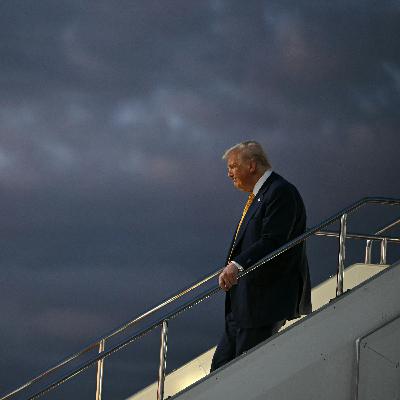










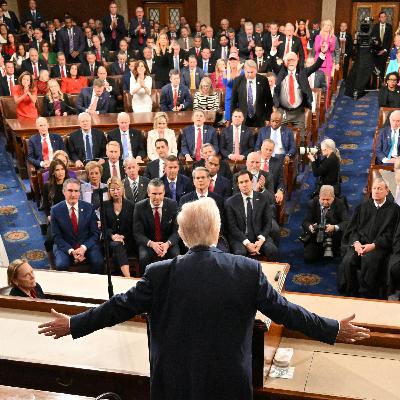

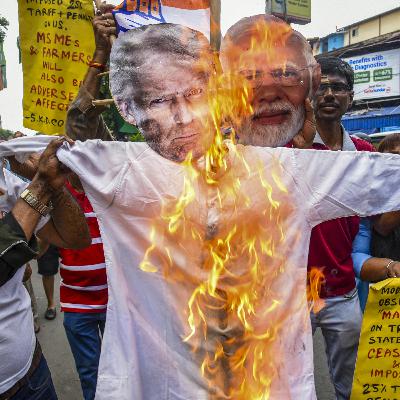
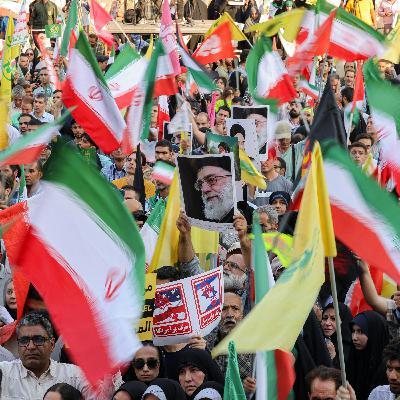
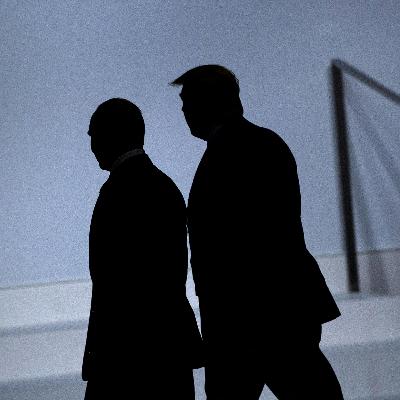



Scrote hugger interview.
Wow. Mishra clearly resents the west. But playing the woke card isn't working anymore.
You got a good vouch, twice, but I'm done. Not interested in narratives. Sorry.
6 minutes 40, best I could manage. There's too much noise and not enough signal. Masks? Really? I get that you're conveying the sentiment, and respect, because few do, but don't try and sell me the packaging, its crass.
To grade 'Bidens' policies is peak act-as-if. What do you take me for?
You can't look at Ukraine in isolation any more than you can view the war entirely through the lens of kinetic kill chains. Interest and exchange rates. Oil and gas prices. Politics. Information. All are weaponised. A theory of victory here is not found in the fields of Ukraine.
Its like they invited us to play chicken limbo but then learned they didn't have the calves for it.
An absolute partisan take on disinformation. As if we didn't see Hillary's Russia hoax rip the country in half. As if we didn't see censorship over the origin of the Pandemic. And as if we didn't see CIA leaders sow disinformation during an election in order to mask the Biden family selling access. No doubt the right and Trump run their own massive disinformation offense, but to think the Maga nuts have a monopoly on this is just boring partisan garbage.
The amount of arrogance demonstrated in this podcast is incredible.
feeling stupid in hindsight?